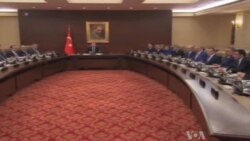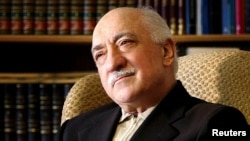LONDON —
Turkey's government has been hit with a corruption scandal that appears to be part of a political rivalry.
The scandal has brought protesters to the streets of Istanbul, demanding the prime minister's resignation. Many Turks have become increasingly angry in recent years over what they see as excessive moves toward Islamization. The alleged corruption rekindled their activism, last seen in a series of protests during the summer.
This time, the protests were triggered by allegations that let to dozens of arrests, including the sons of two cabinet ministers alleged to have been involved in payoffs for real estate deals involving large amounts of cash and gold.
Prime Minister Recep Tayyip Erdogan replaced those ministers this week, along with eight others, but the moves failed to stop calls for his resignation. Indeed, one of the fired ministers said the prime minister should step down, too.
The government further stoked public anger by firing hundreds of senior police officials involved in the anti-corruption probe, including the Istanbul police chief.
Erdogan, who has been in office for 12 years, called the police operation “extremely dirty.”
He said police officers had “abused their authority,” and that the government was within its rights to remove them.
The controversy has brought into the open the increasingly bitter rivalry between the prime minister and a former political ally, the reclusive Islamic cleric Fethullah Gulen, who lives in a private compound in the United States. He is said to wield significant influence in the Turkish police force and in the prosecution service.
A prosecutor was removed from the case Thursday after complaining that police officials were refusing to enforce court orders related to his investigation.
At the Cumhuriyet newspaper offices in Ankara, Utku Cakirozer says reduced confidence in Turkey's government and judiciary will damage the country domestically and internationally.
“As a candidate for European Union membership, Turkey pledged to comply with EU standards in all fields. And one of the most important is the rule of law and maintaining the freedom and impartiality of the justice system,” he said.
Turkey's EU membership bid is perennially on the back burner, and this scandal will likely help keep it there. Erdogan will struggle to restore his damaged credibility, especially if, as some have predicted, he himself becomes caught up in the scandal as it unfolds.
The scandal has brought protesters to the streets of Istanbul, demanding the prime minister's resignation. Many Turks have become increasingly angry in recent years over what they see as excessive moves toward Islamization. The alleged corruption rekindled their activism, last seen in a series of protests during the summer.
This time, the protests were triggered by allegations that let to dozens of arrests, including the sons of two cabinet ministers alleged to have been involved in payoffs for real estate deals involving large amounts of cash and gold.
Prime Minister Recep Tayyip Erdogan replaced those ministers this week, along with eight others, but the moves failed to stop calls for his resignation. Indeed, one of the fired ministers said the prime minister should step down, too.
The government further stoked public anger by firing hundreds of senior police officials involved in the anti-corruption probe, including the Istanbul police chief.
Erdogan, who has been in office for 12 years, called the police operation “extremely dirty.”
He said police officers had “abused their authority,” and that the government was within its rights to remove them.
The controversy has brought into the open the increasingly bitter rivalry between the prime minister and a former political ally, the reclusive Islamic cleric Fethullah Gulen, who lives in a private compound in the United States. He is said to wield significant influence in the Turkish police force and in the prosecution service.
A prosecutor was removed from the case Thursday after complaining that police officials were refusing to enforce court orders related to his investigation.
At the Cumhuriyet newspaper offices in Ankara, Utku Cakirozer says reduced confidence in Turkey's government and judiciary will damage the country domestically and internationally.
“As a candidate for European Union membership, Turkey pledged to comply with EU standards in all fields. And one of the most important is the rule of law and maintaining the freedom and impartiality of the justice system,” he said.
Turkey's EU membership bid is perennially on the back burner, and this scandal will likely help keep it there. Erdogan will struggle to restore his damaged credibility, especially if, as some have predicted, he himself becomes caught up in the scandal as it unfolds.






